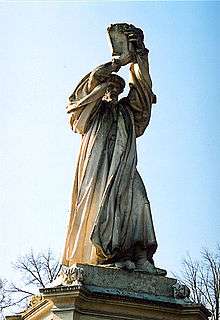William Farel
| William Farel | |
|---|---|
 Oil on wood, 16th Century in the Bibliothèque Publique et Universitaire, Geneva. | |
| Born |
Guilhem Farel 1489 Gap, Kingdom of France |
| Died |
1565 (aged 75–76) Canton of Neuchâtel, Switzerland |
| Residence | Switzerland |
| Occupation | Pastor, theologian |
| Years active | 1522–1565 |
|
Theological work | |
| Era | Reformation |
| Language | French, Swiss |
| Tradition or movement | Reformed, Calvinist |
William Farel (1489 – 13 September 1565), Guilhem Farel or Guillaume Farel (French: [gijom faʁɛl]), was a French evangelist, and a founder of the Reformed Church in the cantons of Neuchâtel, Berne, Geneva, and Vaud in Switzerland. He is most often remembered for having persuaded John Calvin to remain in Geneva in 1536,[1] and for persuading him to return there in 1541,[2] after their expulsion in 1538. They influenced the government of Geneva to the point that it became the "Protestant Rome", where Protestants took refuge and non-Protestants were driven out.[3] Together with Calvin, Farel worked to train missionary preachers who spread the Protestant cause to other countries, and especially to France.[4]
Life


Farel was born in 1489 in Gap.[5] He was a pupil of the pro-reform Catholic priesthood, at the University of Paris, in the earliest years of the Reformation. There he met the scholar Jacques Lefevre d'Etaples[6] who helped Farel obtain a professorship to teach grammar and philosophy at the Collège Cardinal Lemoine in Paris. With Lefevre he became a member of the Cercle de Meaux gathered together from 1519 by the reform-minded bishop of Meaux, Guillaume Briçonnet. Farel eventually became regent of the college. By 1522 he was appointed a diocesan preacher by the Reformist bishop of Meaux, Guillaume Briçonnet. Farel now could invite a number of evangelical Humanists to work in his diocese to help implement his reform program within the Catholic Church.
This group of Humanists also included Josse van Clichtove, Martial Mazurier, Gérard Roussel, and François Vatable. The members of the Meaux circle were of different talents but they generally emphasized the study of the Bible and a return to the theology of the early Church. While working with Lefevre in Meaux, Farel came under the influence of Lutheran ideas and became an avid promoter of them. After condemnation by the Sorbonne, Farel evangelized fervently in the Dauphiné.
Farel was forced to flee to Switzerland because of controversy that was aroused by his writings against the use of images in Christian worship. He spent time at Zurich with Huldrych Zwingli and at Strasbourg, with Martin Bucer. He convinced Neuchâtel to join the Reform in 1530.[7]
Farel established himself in Geneva in 1532, where he remained as minister, drawing Calvin to the city, but breaking with him over the Eucharist. He, along with Calvin, was banished from Geneva in 1538, in part for his rigorous positions, and retired to Neuchâtel, where he died.
Although Farel was a friend of Calvin's,[8] he was a promoter of Lutheran ideas in his youth.[9]
Notes
- ↑ González 1984, p. 65
- ↑ Latourette & Winter 1975, p. 758
- ↑ Latourette & Winter 1975, p. 751
- ↑ Latourette & Winter 1975, p. 891
- ↑ "Guillaume Farel". Encyclopædia Britannica. Retrieved January 14, 2016.
- ↑ Latourette & Winter 1975, p. 750
- ↑ González 1984, p. 68
- ↑ MacVicar 1955, p. 175
- ↑ Marshall 2007
References
- González, Justo (1984), "John Calvin", The Story of Christianity, 2, Peabody: Prince Press, ISBN 978-1-56563-522-7
- Latourette, Kenneth; Winter, Ralph (1975), "The Rise of the Reformed and Presbyterian Churches", A History of Christianity, 2, Peabody: Prince Press, ISBN 978-1-56563-329-2
- MacVicar, Donald (June 1955), "William Farel, Reformer of the Swiss Romand, His Life, His Writings and His Theology", Church History, Cambridge University Press, 24 (2): 175, doi:10.1017/3161654, ISSN 0009-6407, JSTOR 3161653
- Marshall, Peter (2007), "Leaving the World", in Matheson, Peter, Reformation Christianity, Fortress Press, ISBN 978-0-8006-3415-5